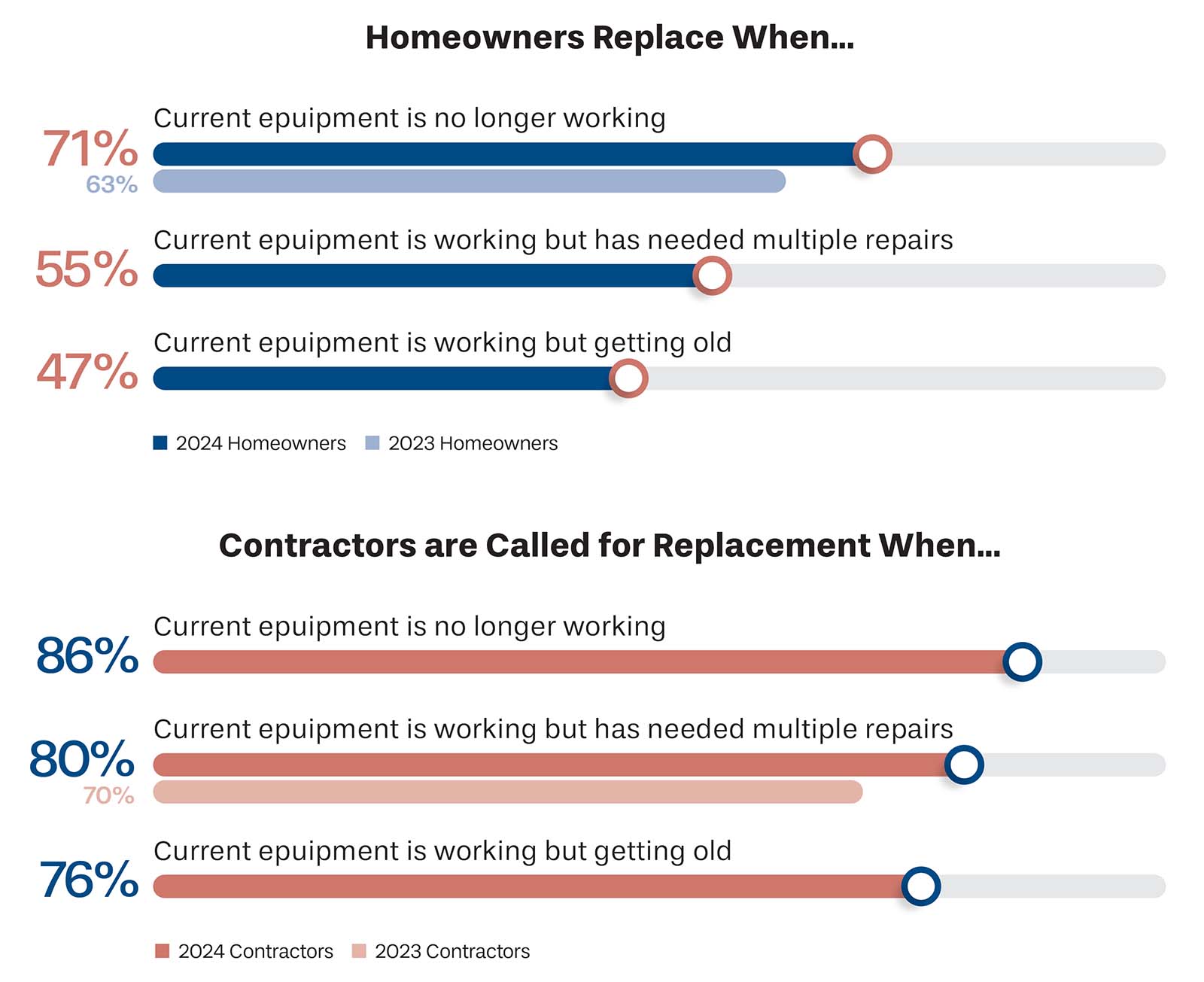A recent survey done by Clear Seas Research, on behalf of The ACHR NEWS, discovered just what triggers a homeowner to replace their HVAC equipment.
According to the survey, 71% of homeowners replace their equipment once it’s no longer working (an 8% increase from last year’s data), 55% replace when their current equipment is working but has needed multiple repairs, and 47% replace when their current equipment is working but is getting old.

TRIGGERS: 80% of homeowners replace when their current equipment is working but has needed multiple repairs, a 10% increase from last year’s data.
This data aligns well with what contractors are seeing in terms of when and why their homeowner customers choose to replace their equipment. As part of the same study, 86% of contractors surveyed answered that the most frequent reason they are called for a replacement is when a homeowner’s equipment is no longer working, 80% answered it’s when their current equipment is working but needs multiple repairs (a 10% increase compared to last year’s data), and 76% answered it’s when their equipment is working but getting old.
Other homeowner and contractor data gathered included when homeowners are getting ready to sell their home, and when they want to upgrade to energy-efficient equipment.
The majority of homeowners waiting until their HVAC equipment breaks to replace can likely be attributed to their lack of education on HVAC systems in general and thus their lack of knowledge on when the best time is to repair vs. replace — and, of course, the cost. So, if contractors want to increase the amount of replacements or repair jobs they are getting, they first have to inform their customers of the options.
If It Ain’t Broke, Don’t Fix It
There are many reasons why most homeowners wait until their HVAC system is broken to replace it. The most significant reason is the cost.

EDUCATE AND EASE: The industry is getting better at informing, educating, and serving the customer’s needs when presenting options for new HVAC systems. (Courtesy of Nexstar Network)
Jerome Johnson, Nexstar sales coach, thinks this has a lot to do with homeowners being miseducated on what it means to replace their HVAC system.
“Most homeowners may not think twice about that box of air in their home, and in their minds, it works just fine,” Johnson said. “What they fail to recognize is that you’re offering them an opportunity to enhance their everyday living and improve their overall comfortability inside their home.”
Looking for a reprint of this article?
From high-res PDFs to custom plaques, order your copy today!
Homeowners not thinking about their HVAC is proof that the industry has been successful in its job of designing and installing equipment that is built to last.
“It's a testament to the effectiveness of our industry from design engineers to manufacturing to installing contractors that no one thinks about HVAC,” said Matt Michel, author of “Contractor Stories: Inspirational Lessons for Contractors with a Burning Desire to Succeed” and a recipient of ACHR NEWS’ Legends of HVAC Award. “It just works, year in and year out.”
The flip side, though, is not thinking about replacing these systems until they finally stop working.
“Some homeowners believe their HVAC systems will last longer than they actually do,” said Matt Atkins, Air Conditioning Contractors of America (ACCA) manager of HVACR education. “They might not realize the benefits of proactive replacement regarding energy efficiency, comfort, safety, and reduced maintenance costs.”
Many homeowners might also not be aware of the economics behind replacing their HVAC system, or potential signs that would indicate they need a new one.
“Anyone with a 15-year-old air conditioner is likely running at suboptimal efficiency, even if maintained,” Michel said. “It's the nature of mechanical systems that they degrade over time unless maintained extremely well. So, there is some savings from efficiency, which is only going to increase as the nation transitions away from fossil fuel-based generation to renewables.”
Homeowners also might not realize that when they make a repair on their unit rather than replacing it, they are just delaying the inevitable. While it might extend the life of the equipment a year or two, eventually they will have to replace it. And that money they put into the repair could have gone toward the replacement.
Easing Homeowner Concerns
Needless to say, there are a lot of things that homeowners still don’t understand about their HVAC equipment — such as why it’s so important to make the right decision when deciding to repair or replace, resulting in concerns about the monetary investment of something like a full HVAC system replacement. This is where contractors step in to help ease those concerns.
“You first must let them know that you’re there to help,” Johnson said. “It’s not to fix or sell, but to help. Then set expectations by letting the homeowner know how the call will go, being clear in describing what they can expect from you and your company.” Contractors should then explain the process of how they are going to educate and address any concerns homeowners may have from the beginning.
Transparency is key. It’s best to tackle the pain points head-on by being upfront about the costs and energy savings.
“Note warranties and the peace of mind from extended warranties,” Michel said. “Discuss what exactly is involved in a replacement, what you do to protect the home, and how long it will take. If you can't complete it in a day, offer to put them up in a hotel for a night. Price this into the job if worried about the expense. Try to turn a negative into a positive.”
Contractors should also showcase their expertise and professionalism by highlighting their experience with installing HVAC systems and reassure homeowners that the replacement process will be done with minimal disruption to their homes.
“Discuss improvements in energy efficiency, indoor air quality, and overall comfort that they can expect with modern equipment. … Explain different models, their features, energy efficiency ratings, and costs,” Atkins said. “This allows homeowners to feel involved in decision-making and choose a system that fits their needs and budget.”
sales coach
Nexstar
Better Educating Homeowners
Once a homeowner’s concerns are addressed, contractors will likely still have to further educate them, in clear and simple terms, on when is the best time to repair vs. replace.
“It starts with comfort,” Johnson said. “If your HVAC system provides the level of comfort you want, consider keeping it or upgrading it. Secondly, look at warranty and cost of ownership. Most warranties are 10-year parts and two-year labor unless you get the extended labor warranty, which puts you at 10 years of labor. Once you analyze the average part and labor cost for repairs on a system outside of the warranty, it just doesn’t make sense to keep dumping money into a system that still requires maintenance. … Showing a customer the math behind an inefficient system can be a powerful way to help inform and educate them.”
Contractors have to also ensure they are presenting their homeowners with a number of options, and then thoroughly educate them on each and every one. During service calls, contractors have to take the time to tell homeowners how HVAC systems work, what things help/hurt the lifespan of the equipment, and the signs that indicate it’s time for a replacement. They need to ensure that when they do educate, they are using layman’s terms to make sure their homeowners understand.
“Utilize data-driven insights where possible,” Atkins said. “For instance, show homeowners energy consumption data or maintenance records that illustrate their current system's declining efficiency or reliability. This can help substantiate recommendations for replacement. Avoid sales tactics that pressure homeowners into unnecessary replacements. … Contractors should ensure their sales and service teams operate with honesty and integrity and are qualified to assess an HVAC system to present the homeowner with solutions to benefit their client.”
“If there's a repair, quote the repair investment, note that once equipment starts breaking down, there will probably be more repairs in the future, and ask if people would like to also look at a new system,” Michel said.
Some will, and some won’t. But it’s not a contractor’s job to decide what a homeowner should do.
“It's our job to give the options and provide honest counsel,” Michel said. “If the homeowner asks what you would do, be honest. If you are honest and build a good relationship, you are likely to get the repair, if not now then next year or the year after that. In the meantime, you are making good margins on the repairs.”
Of course, for this education to be impactful to the homeowner, technicians have to be properly trained and certified, which includes staying updated on the latest HVAC technologies and best practices. This way, technicians can accurately assess the equipment’s condition to provide an informed recommendation to the homeowner.
“Encourage transparency in assessments,” Atkins said. “Technicians should clearly explain the condition of the HVAC system, highlighting factors like age, efficiency ratings, and safety factors. They should provide homeowners with options and explain each choice's potential long-term benefits and drawbacks (repair vs. replacement).”














